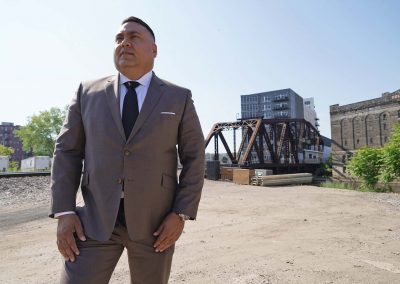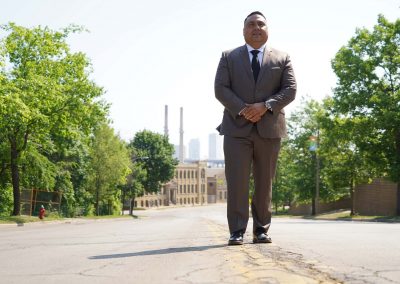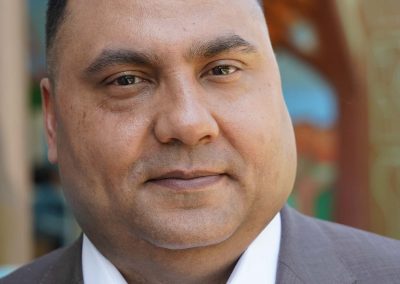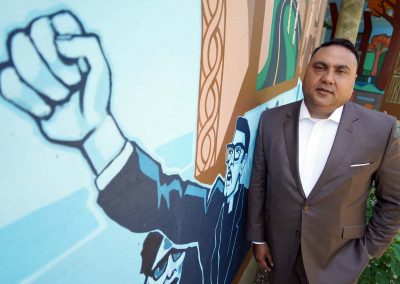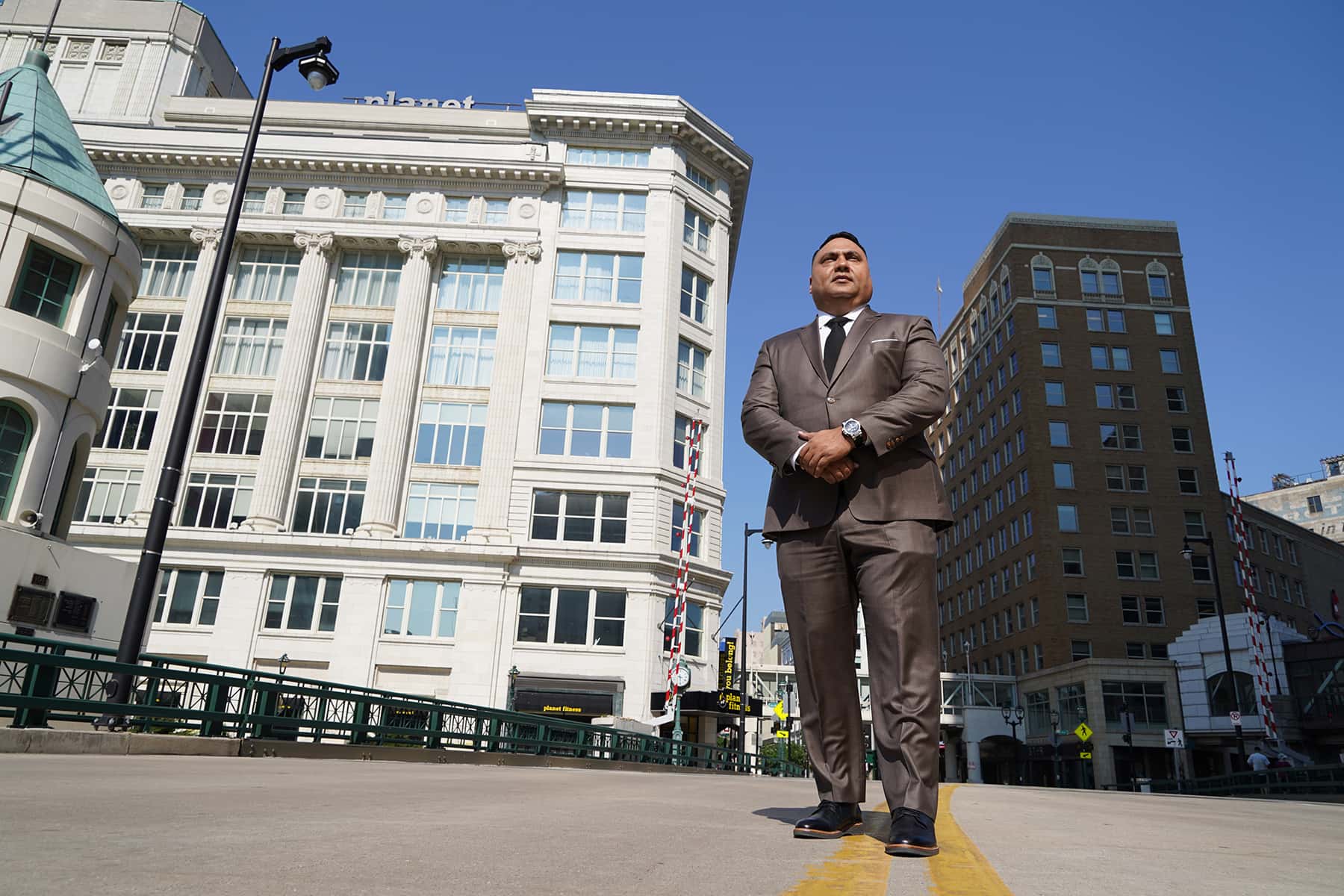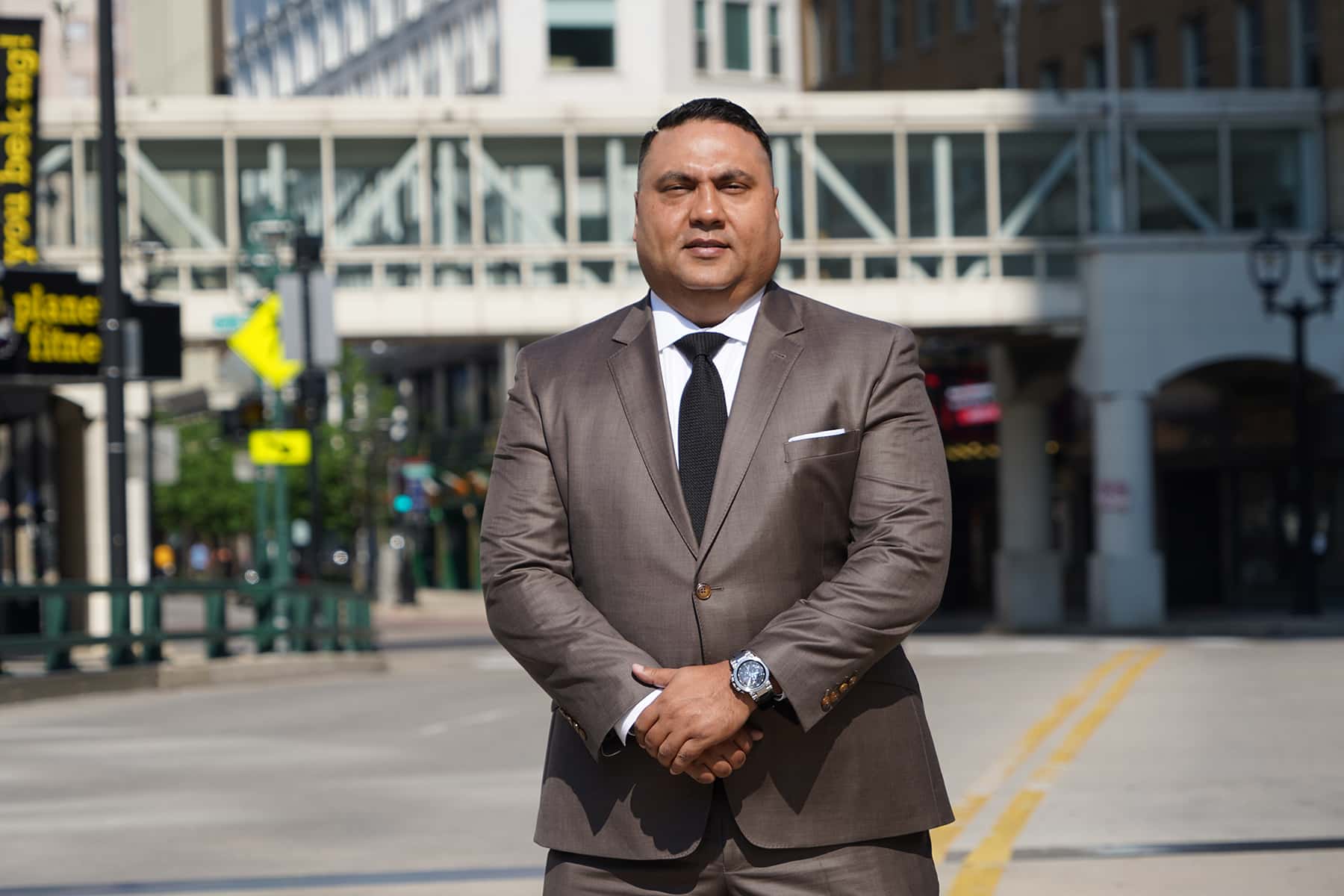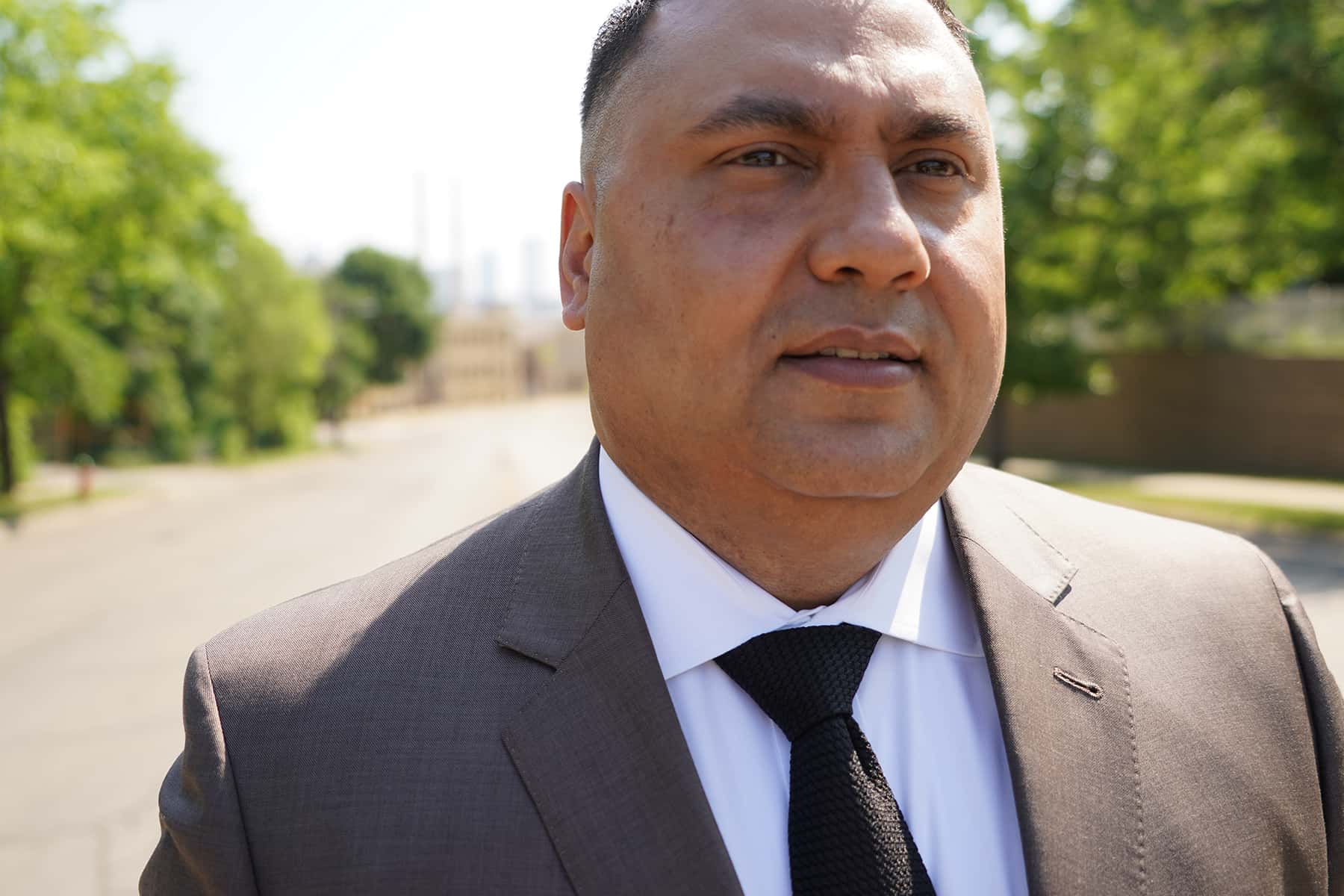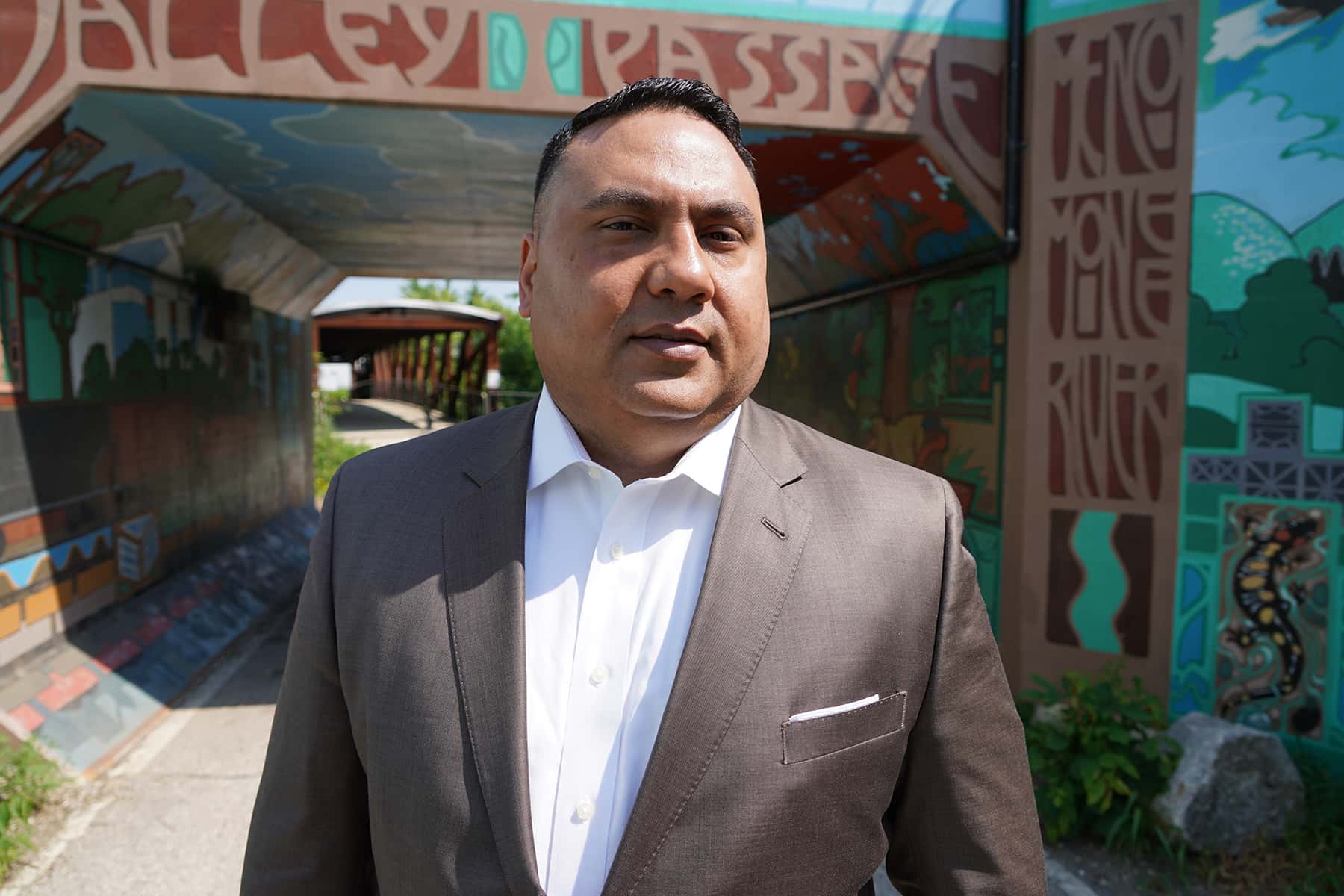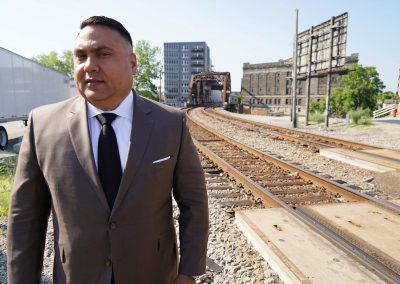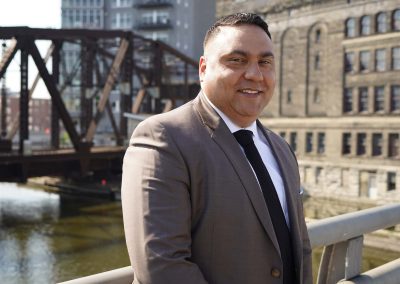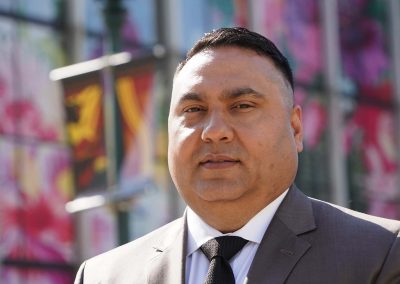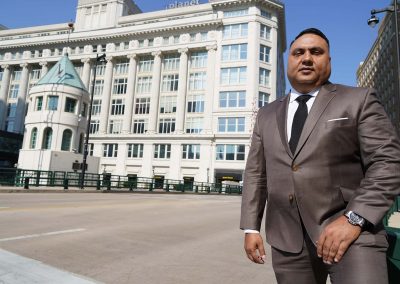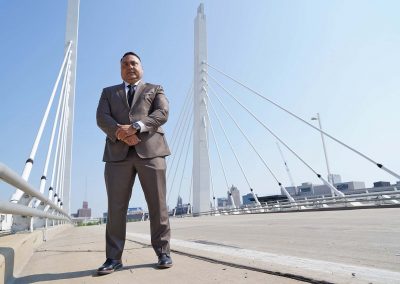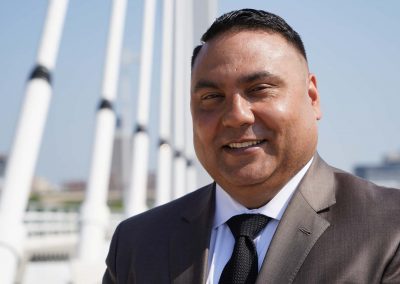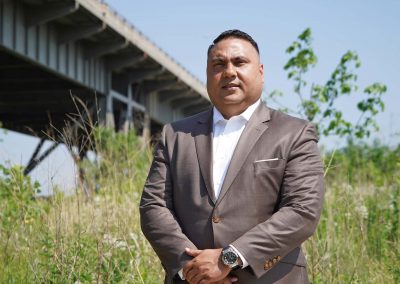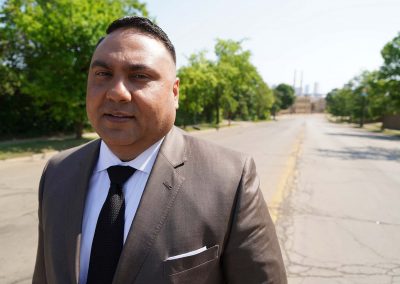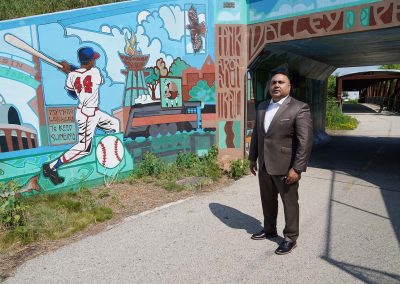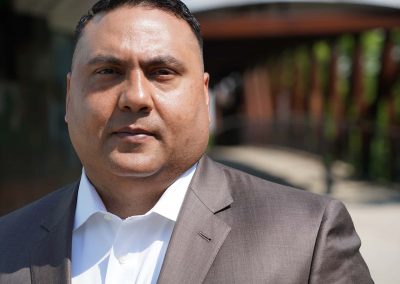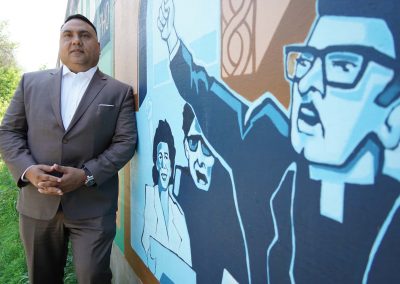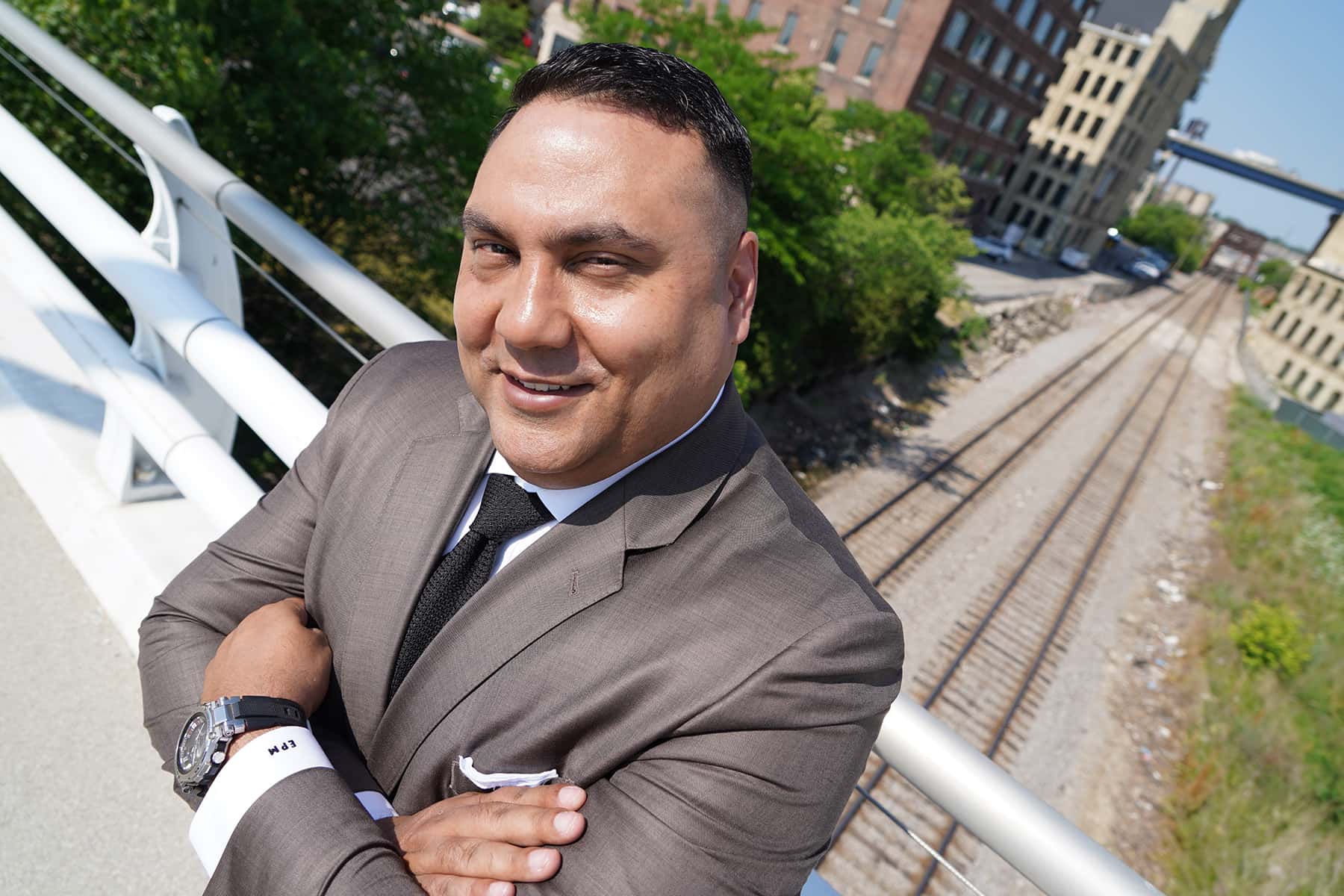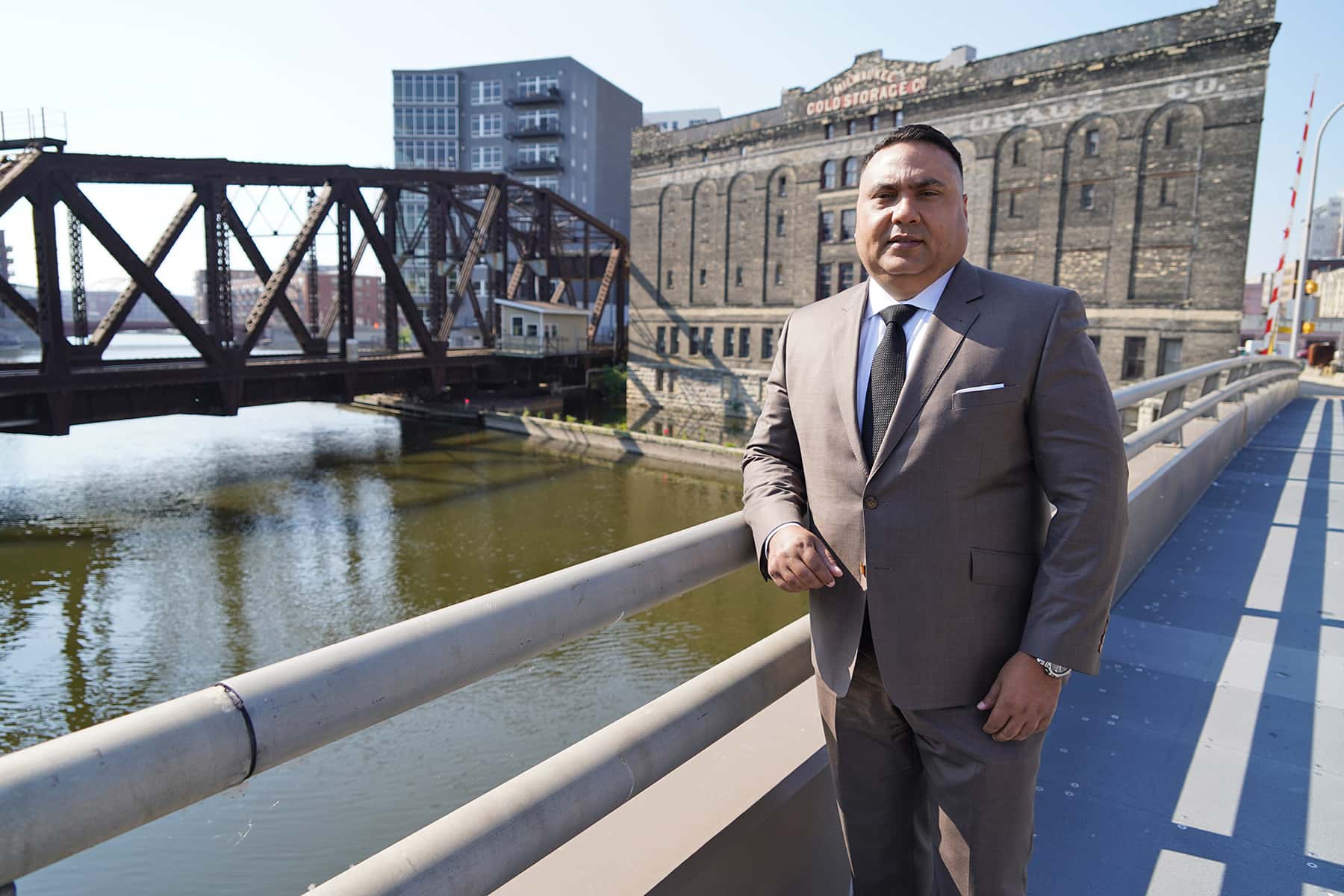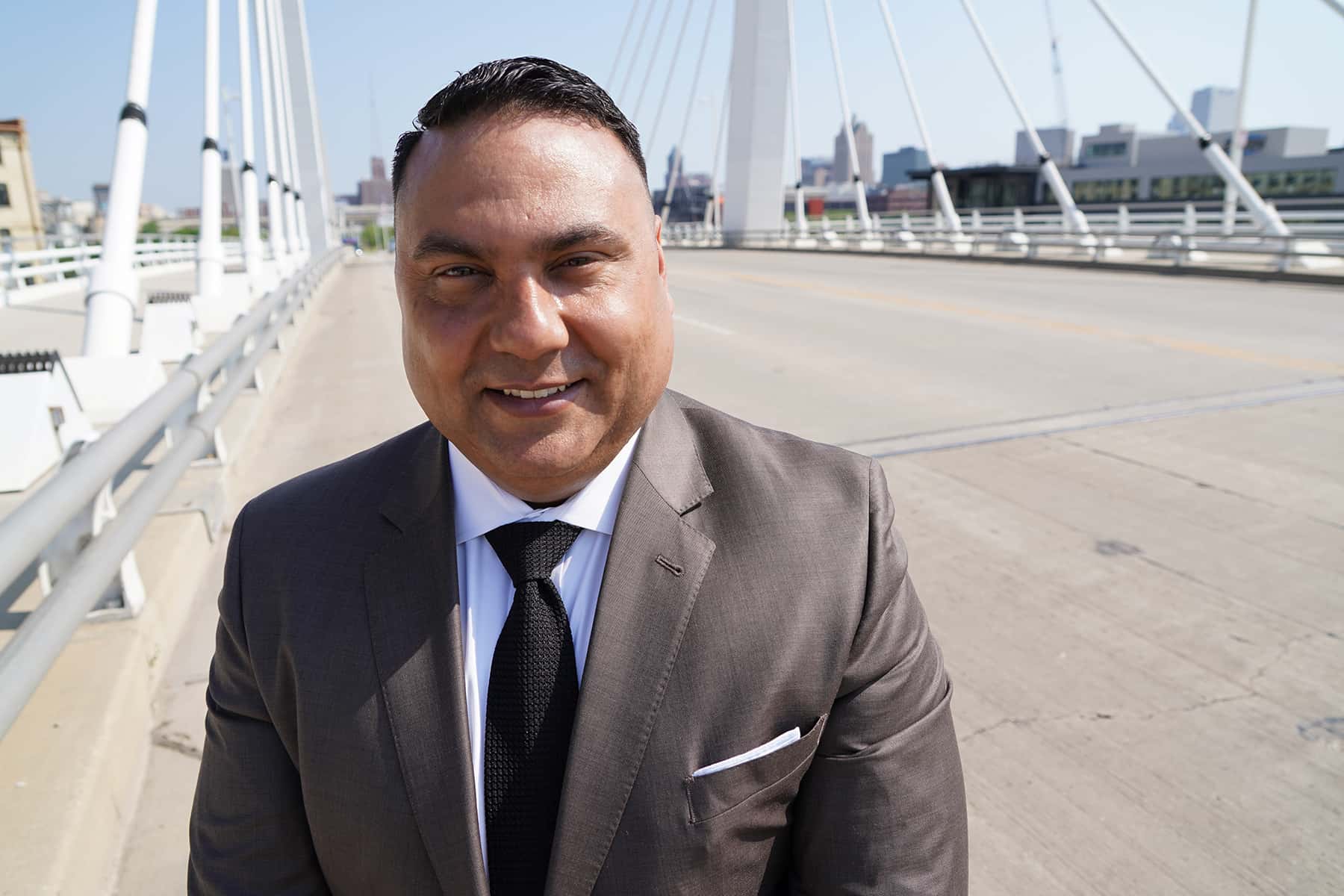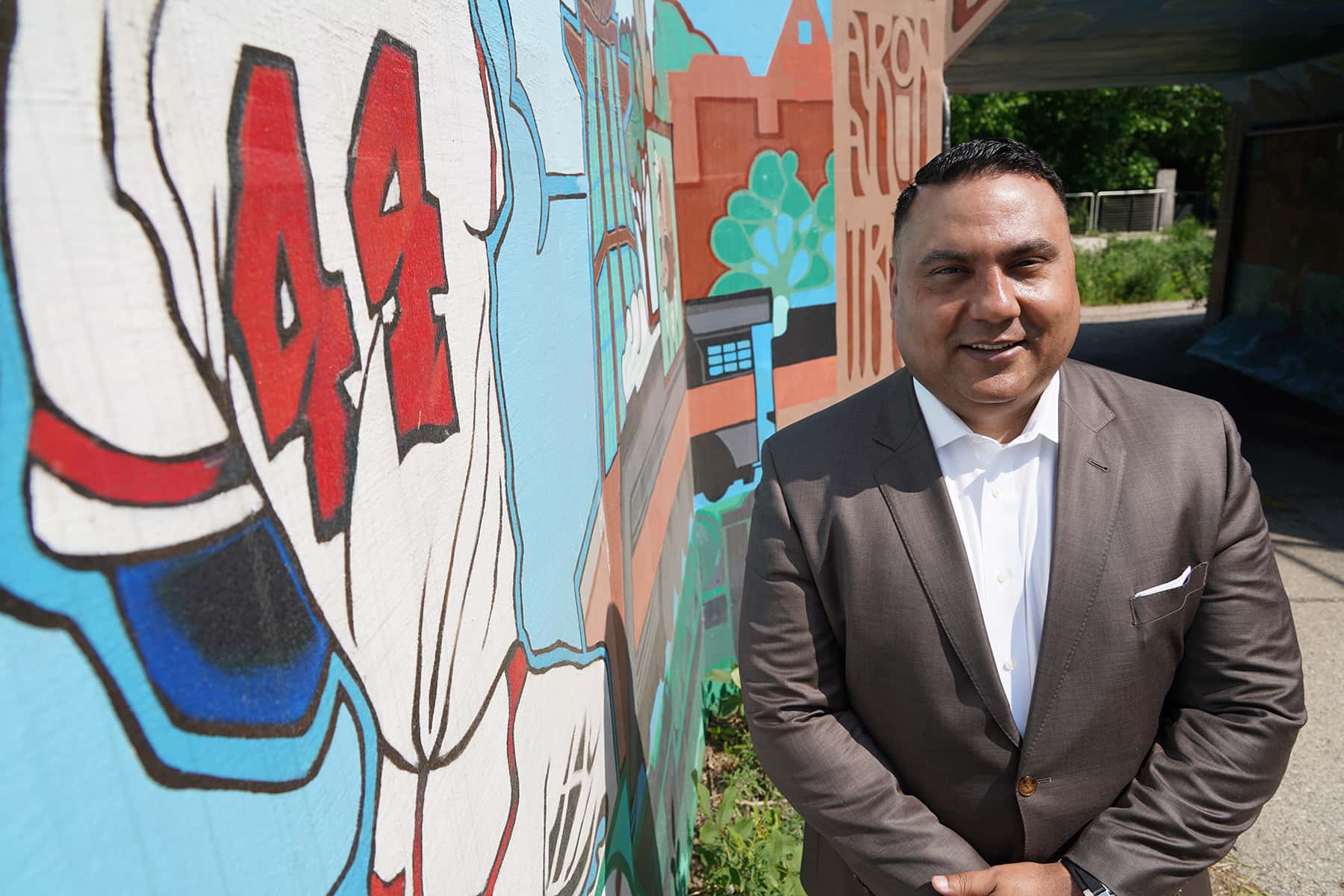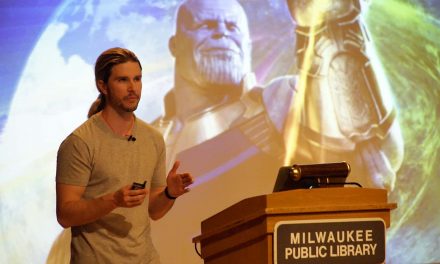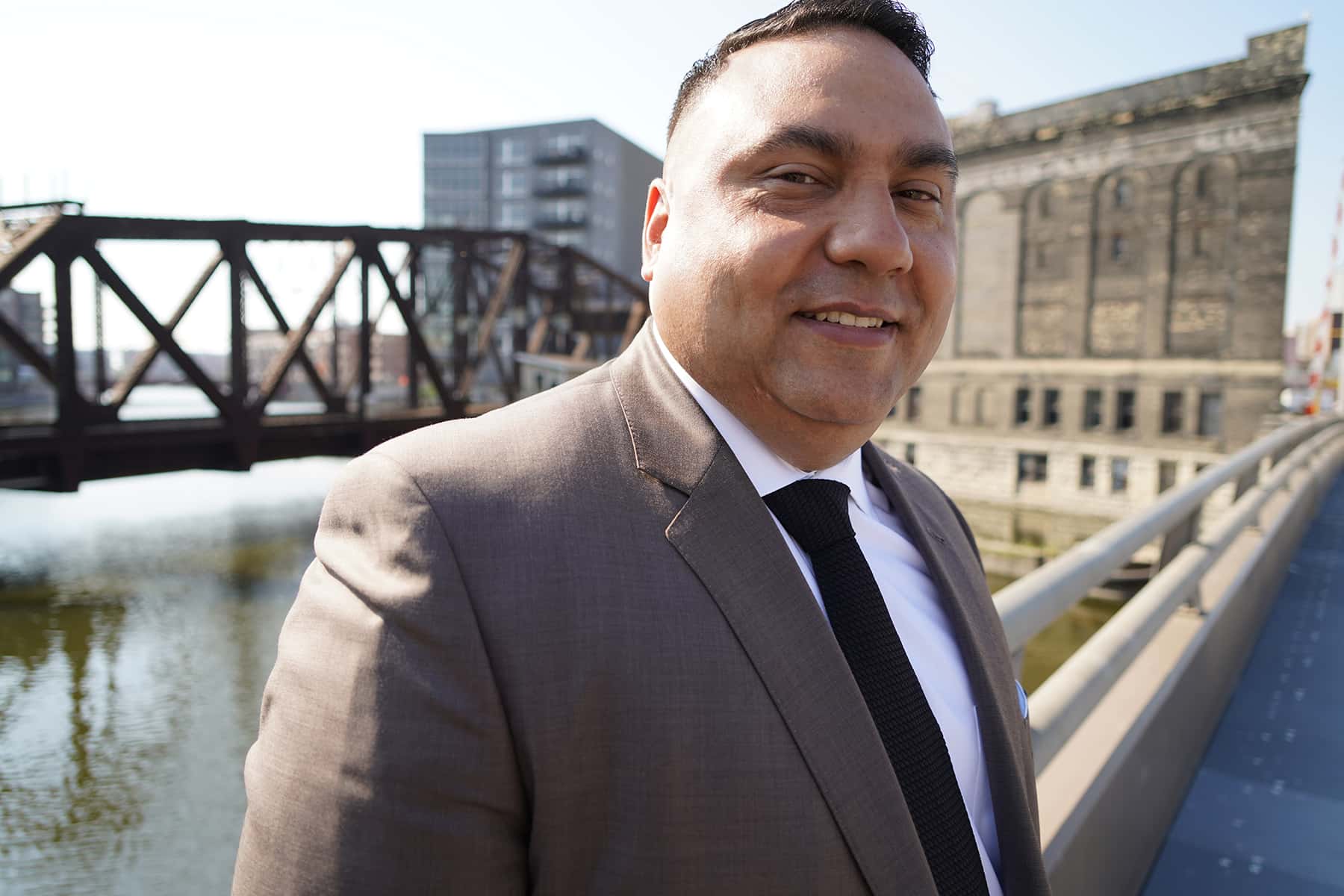
With a steadfast focus on community outreach, Eugene Manzanet has leveraged his life lessons, educational credentials, and feet-on-the-ground career experiences to address the wide ranging issue of generational trauma in Milwaukee.
After serving several years in the Armed Forces, Manzanet’s career path took him into the banking industry for the next two and a half decades. That journey and his extensive community building efforts with nonprofit organizations made him the ideal candidate for a new and daunting leadership role: forming strategic collaborations to make systematic improvements for the wellbeing of residents in Milwaukee.
Q&A with Eugene Manzanet
Milwaukee Independent: What was the fondest memory from your youth? And, who was the most influential person during your formative years?
Eugene Manzanet: I have to say that being born in New York City and raised in the Bronx, two blocks away from Yankees Stadium that my fondest memories were around baseball. I was able to play competitive baseball programs around the entire city. Playing in Central Park for GOYA is something I look back on and tell my kids about, the games, the friendships, and the competition.
Milwaukee Independent: How did growing up in the heart of the South Bronx shape your identity and prepare you as an adult?
Eugene Manzanet: The sizeable dense city prepared me for life outside the Big Apple. The fast-paced life, the need to be constantly aware of your surroundings and fully present, sharpened my senses. Couple that with a Catholic Jesuit upbringing and education has allowed me to appreciate the efforts of my mother, who raised me under the difficult circumstances of living and being raised in the projects of the South Bronx. She worked explicitly to keep me in and graduate from Catholic private school, allowing me to develop the basic skills needed to go to college.
Milwaukee Independent: After serving eight years in the United States Marine Corps Reserve, what did that experience teach you about yourself that you did not expect? And how are you still applying that lesson?
Eugene Manzanet: For decades, the Marine Corps has developed recruits into men by instilling them with discipline, the intensity with a higher level of confidence and resolve to take on all challenges. The same lessons and approach have allowed me to excel in corporate banking, my education, and my work in the community.
Milwaukee Independent: Is there anything you miss about being a Marine? And, by contrast, what do you enjoy most about civilian life?
Eugene Manzanet: The structured lifestyle of living on bases and as a reservist in the Marine Corps can enjoy the opportunity to serve with some amazing fellow Marines that have become lifelong friendships. In addition, I have enjoyed the opportunities to work for some significant corporate entities, with wonderful people and compassionate leadership that supported me in my efforts and work in the community.
Milwaukee Independent: What was the journey that brought you from New York to Milwaukee, and why did you decide to stay here?
Eugene Manzanet: I made a stop at our nation’s capital, Washington DC, where I worked as a Congressional intern for Jose Serrano of the Fifth district of my hometown. I was about to be a Congressional intern; I decided not to return to the Bronx and go to Milwaukee. Before my college days in high school, I met a young lady who eventually became my wife. It was a phone call with her that ultimately help me to choose to pursue a life in Milwaukee.
Milwaukee Independent: In your view, what is the biggest strength of Milwaukee’s Latino community compared to other cities? And, how has the impact of COVID-19 been related?
Eugene Manzanet: I think the Latino Community has fundamentally strong neighborhood organizations with quality leadership with some political influence. But yet the business sectors have struggled to grow, and COVID-19 only exacerbated the vulnerabilities of the small business sector who have struggled to stay opened or survive. Post-COVID -19 will a hard restart and rebuild the small business, but the community has a solid infrastructure to inform, educate and guide our residents to life after COVID-19.
Milwaukee Independent: How do you compare your youth in the South Bronx to the conditions your children experience now on the northwest side of Milwaukee?
Eugene Manzanet: The life I had growing up in the Bronx is far from what my kids live today. I grew up in the streets of South Bronx, stickball and two-hand touch football on the concrete streets or the parking lots of Yankee Stadium. I was happy to have the opportunity to see an actual game at Yankees Stadium. The life that my wife I have worked hard to put together for our family of six is different; some would say safer from where I grew up. In the Bronx, to play and hang out on the block, you needed some street savvy to survive. You always took account of who was around you and what they were doing. You never wanted to be in the wrong place by accident and caught up in some fight over a drug spot or street brawl for creditability. My kids don’t have the same worries and conditions I grew up in. Although I lived with my mom in the Morris Ave projects, I spent most of my time with my grandparents and their neighborhood of 162 Ogden Ave. I believe that my wife and I have provided a stable home within a subdivision of homes with great neighbors. My kids don’t have the same concerns and can enjoy living with huge yards and area neighborhood friends.
Milwaukee Independent: How did you become interested in working in the financial industry, particularly in community development banking?
Eugene Manzanet: I was relocating from working as an intern in Washington DC for my congressman from the Bronx Jose Serrano office, which was a great experience and allowed me to sharpen some essential professional skills, especially working the phones and researching topics for the staff of the congressman. When I arrived here, I needed a job, and I got the opportunity to learn the mortgage business. That allowed me to enter into my first bank position at First Bank of Milwaukee, which became U.S. Bank. It was there that I was introduced to the community development world of banking. I was to not only represent the bank but sell their products and services. My eagerness to learn allowed me to grow into several banking positions of management, into small business banking. Each roll had a community component that I enjoyed, educating, influencing, and providing guidance to business owners and then ultimately organizational leaders in the market.
Milwaukee Independent: What was the biggest challenge you faced trying to support increased homeownership and small business growth in Milwaukee?
Eugene Manzanet: It has always been trying to have our community meet the standards of the bank. The banks rarely allow themselves to meet the community where they are at with their credit and or required liquidity positions for lending. It has always been a climb and task to catch up to the banks to where they are most comfortable in being. Coaching clients up was always the fun part but also the most challenging. That is still true today, especially with technology driving the banking industry, creating a larger divide. We need remind the bank and their bankers to truly take to heart the value of being a resource of information and coach their clients up. Far too many clients are treated as a just an application to be added to a list for hitting a monthly bonus.
Milwaukee Independent: How can local financial institutions do more to level the economic playing field for people of color, especially after decades of redlining and other racial inequity policies?
Eugene Manzanet: Do a better job of listening and realizing that at some point, they can meet the community where they are at without risking themselves to higher losses. They also need to understand the technology gap is real and has only made the gap far more difficult for some to catch up to and allow more people of modest means to lift themselves up from. Finally, local institutions need to listen to the actual challenges of the communities they want to serve and meet the community where they are at with products and services. Simplify the process for them and not make it more complicated just make it more convenient for the banker to hit bonuses and the bank is able hit higher revenues. The most important things they need to listen and reconnect with the to the public to learn what are the rue needs are not to ignore their needs and what is best for those they serve, not just for the bank.
Milwaukee Independent: You serve on numerous nonprofit boards and advisory councils – like Journey House, Bublr, and Employ Milwaukee, so why are you passionate about reaching disenfranchised communities and enhancing the quality of life in Milwaukee?
Eugene Manzanet: I was raised in the South Bronx projects, where there were no or limited social support systems that would focus on improving the living experience of the neighborhood and area. It seemed that local leadership was content with provide just enough support. I realize that the density of the number of people that lived in the projects made it hard to raise the quality of life. I now focus on the things I wished my family would have had when I grew up to improve our living experience.
Milwaukee Independent: What do you enjoy most about being a commissioner and vice-chair for the Milwaukee Metropolitan Sewerage District? And what is the most important thing MMSD does that people are usually unaware of?
Eugene Manzanet: The opportunity to work with an amazing team of industry leaders within Kevin Schafer and the entire administrative leadership of the MMSD. I have admitted I needed to take a crash course on the history of and development of the sewer systems in Milwaukee and internationally. The most important thing I believe that people don’t know or understand is MMSD efforts in taking an equitable approach in community building and infrastructure development for our community. Important system large-scale maintenance and development projects that are chosen to be done in our communities of most need to beautify while serving as upgrades to our system. In addition to the innovative social entrepreneurial approach in leveraging the sale of Milorganite to diversify revenue sources for the district and reduce the cost to the ratepayers. The most important work is really focused on the consistent effort to maintain high-quality management of the recycling system. It is regarded as one of the best in the country, with a capture rate of above 98%. We will continue to safeguard our greatest natural resources, Lake Michigan, and the waterways in and around Milwaukee.
Milwaukee Independent: Why were you inspired to leave the banking profession to pursue a doctoral degree at Cardinal Stritch University?
Eugene Manzanet: I decided to pursue my doctoral research and degree as I completed my master’s degree. I realized that I had an opportunity to pursue studies in a program that genuinely fit within my focus over my career in banking, “Leadership for the advancement of service.” The study of community and organizational leadership to advance important service for our communities has focused on my corporate banking career and experience. It has fueled the passion for getting up every day to find a way to improve the city I have raised my family and made my career. I fell in love with Milwaukee 31 years ago, and I continue to find reasons every day to stay optimistic about our future.
Milwaukee Independent: How did your involvement with Mission Fuel prepare you for your new role as the first executive director of Scaling Wellness in Milwaukee (SWIM)?
Eugene Manzanet: My involvement began with my decision to focus my doctoral research on sustainable business models for nonprofit organizations. That has been the area of study that allowed me to be considered a good candidate for the role. In addition, I had the correct variables of experience, commitment to community, network, and research study. My experience with Mission Fuel, Mission Fuel, is an intensive program that focuses on the best practices of for-profit business accelerator models that, when modified, help develop nonprofit organizations. The result is training focused on entrepreneurship, innovation, and business development program. The Mission Fuel program is held over fifteen weeks to provide consulting and technical support, entrepreneurial mentoring, and leadership coaching to help participants develop their skills in thinking innovatively to develop concepts for new revenue and organizational growth with an entrepreneurial approach. The Vision of the Mission Fuel: Mission Fuel moves nonprofit organizations from financial dependency to self-sufficiency through earned income strategies, innovation, and leadership development.
Milwaukee Independent: Everything surrounding the issue of trauma is controversial, so what is your framework for educating the public to remove the social stigmas about it?
Eugene Manzanet: The need to amplify the level of information and education to the public to begin to redirect the general conversation about social stigmas around the topic of trauma. The negative stigmas of an individuals need for treatment for trauma related issues is okay and normal. Through collaboration as a central piece to SWIM’s mission, bringing Milwaukee-area trauma-facing organizations into the fold as partners to elevate information and education must continue to be a key area of focus for our organization. The more authentic, effective collaboration increasing access to information treatment and education the greater the benefit to constituents throughout the city. Therefore, SWIM will continue to identify and engage CBO’s, established nonprofits, and system partner members and will continue to hold community meetings as a forum to make headway on making a more trauma informed and resilient Milwaukee.
Milwaukee Independent: What is the biggest challenge to treating trauma in people who deny that they experience it or when their actions cause some form of social harm?
Eugene Manzanet: That will go back to removing social stigmas of trauma and mental health treatments as a negative connotation to receiving help and treatment. We are in an environment with a population of individuals carrying various forms of pressures on top of generational trauma that has gone untreated for far too long. The untreated trauma coupled with the current strains of life can be a formula for possible breakdowns at any point. Unfortunately, the biggest challenge is we have great demand for treatment and just not enough providers with the capacity to address the need.
Milwaukee Independent: How are you bridging the divisive topic of law enforcement reform, specifically for helping officers get trauma counseling?
Eugene Manzanet: We will approach all our outreach efforts by meeting our community partnership where they are and listening and learning from them about their needs and challenges. Law enforcement is no different; I need to develop a trusting relationship with those who can influence change. As those relationships begin to develop, allowing for more fruitful discussions of how we can play a role in assisting conversations moves forward to addressing the necessary reforms we seek to see within law enforcement. More importantly, allow us to partner in ways that our frontline service providers, who should have the highest quality of treatment available to them at any time or day of the year.
Milwaukee Independent: Why is trauma in the workplace so hard to identify and resolve? And, how do conditions in Milwaukee compare to other cities?
Eugene Manzanet: Trauma, be it individual or collective, can be found in every setting. The workplace is an environment that gathers people from varying backgrounds and experiences in one setting. As a result, the people that comprise the workplace community are coming to work every day with varied traumatic life experiences and at different stages of healing. Historically, workers were considered successful if they kept their personal lives separate from work. More and more, there is an effort to make the workplace more personal which means acknowledging that the joys and sorrows of life have an impact on the workplace. Building awareness is the first step towards identifying and addressing problematic policies and procedures that may be re-traumatizing workers. More times than not, in Milwaukee and other cities, those in leadership positions are not aware of how the workplace environment may be negatively impacting workers. We are hoping to both build awareness and provide specific ways to make the workplace more trauma responsive.
Milwaukee Independent: After a year of political turmoil and the economic impact of the COVID-19 pandemic, what do you see as the most severe long-term social trauma that Wisconsin needs to address?
Eugene Manzanet: COVID-19 can be contextualized as a collective traumatic event, not only for us locally in Milwaukee, but across the globe. This is a unique time in history, as we are all grappling with the virus and the ripple effect it has had on our communities. However, it was identified early on, that communities of color in WI and across the US were transmitting and dying from the disease at higher rates than whites. This is due in part to generations of differential access to positive social determinants of health and the high numbers of essential workers in communities of color. As a result, it is these communities that need the most support during COVID-19 recovery.
Milwaukee Independent: Can SWIM provide any quick fixes to generational trauma in Milwaukee while investing in far-reaching solutions for children and grandchildren to avoid a continuation of the cycle?
Eugene Manzanet: There are no quick fixes for generational trauma. In fact, we know from epigenetic studies of groups of trauma survivors, such as those that survived the Holocaust, that the negative impact of an individual’s trauma can be transmitted to multiple future generations through changed gene expression. This is not to say that we cannot have an immediate influence on the impact of trauma, including our ancestors’ trauma. Specifically, bolstering what we call “protective factors”, the strongest for children being a positive connection to a healthy adult, will help mitigate the impact of traumatic events. Building resilience through adaptive coping skills is also very important and effective when managing a traumatic event, especially when coupled with necessary policy changes that address systems which perpetuate trauma. It is critical to emphasize that the onus should not be on the individual who has experienced trauma to “cope better”, but to also demand changes in unhealthy and unjust environments.
Milwaukee Independent: A lot of work being done from the ground up faces setbacks to progress because the top-down system is too institutionalized to adapt, so how do you hope to change that dynamic?
Eugene Manzanet: I hope that SWIM can be the conduit for training and resources for grassroots frontline organizations. As that conduit, I hope to help with the adaptability of the corporate, institutional systems to open themselves to new ways of investing and support efforts that will help support mental health education and treatment that we can continue to amplify and improve effort through out Milwaukee.
Milwaukee Independent: What inspires you? And, what would you tell someone who feels no hope that a sustainable future is possible and can happen in Milwaukee?
Eugene Manzanet: Hope for the future is one of the most important aspects of trauma work. We need to hold on to hope while actively working to change what is not working or just for our communities. What I find inspiring are all the people and organizations who have rallied behind SWIM and share our vision of a just and equitable community where all can thrive. The work that they are doing within their organizations and communities coupled with the collective work we are doing together at SWIM keeps me hopeful in building a more resilient Milwaukee.
Milwaukee Independent: What is your biggest goal for SWIM to accomplish in the next few years, and what can the public do to support your mission?
Eugene Manzanet: I believe that we need to break the silos that we have been operating in. Again allowing SWIM a to become the conduit for collaboration and active resource to help support organizations in leading to meaningful change towards building a strong trauma responsive community.
Milwaukee Independent: What is the one question that people ask you the most, and what is the one thing no one has asked you that you have always wanted to talk about?
Eugene Manzanet: Why did I choose to make Milwaukee the focus of my career and family life? My answer has been consistently the same “Why Not Milwaukee?” I feel I decided to establish myself here in a growing city with a deep history, culture, arts, music and opportunity.
Milwaukee Independent: If you could send a message to yourself in the past at the age of 20, what would you tell your younger self? And, at the age of 20, what question would you send to ask your older self now?
Eugene Manzanet: Stay focus and finish my education much earlier; I should have completed my doctorates in my early thirties. I would send a question directly: did I make the best of use of my time on earth? Let us attempt to make the best of the time given on this earth. The hope I have is that I have made the most of my time to make the most positive impact in the lives I am able to touch.
© Photo
Lee Matz

